九年级英语各单元知识点归纳总结(1)
九年级英语全册知识点大汇总

九年级英语全册知识点大汇总Unit1 How can we become good learners?【重点短语】1. have conversation with sb. 同某人谈话2. tooto 太而不能3. the secret to 的秘诀4. be afraid of doing sth./ be afraid to do sth. 可怕做某事5. look up 查阅6. repeat out loud 大声跟读7. make mistakes in 在方面犯错误8. connect with 把和连接/联系起来9. get bored 感到厌烦10. be stressed out 焦虑担忧的11. pay attention to 留意;关注12. depend on 取决于;依靠13. the ability to do sth.. 做某事的能力【考点详解】1. by + doing 通过方式(by是介词,后面要跟动名词,也就是动词的ing形式)2. talk about 谈论,议论,商议The students often talk about movie after class. 学生们常常在课后商议电影。
talk to sb= talk with sb 与某人说话3. 提建议的句子:①What/ how about +doing sth.? 做怎么样?(about后面要用动词的ing形式,这一点考试考的比较多)如:What/ How about going shopping?②Why dont you + do sth.? 你为什么不做?如:Why dont you go shopping?③Why not + do sth. ? 为什么不做?如:Why not go shopping?④Lets + do sth. 让我们做...吧。
如:Lets go shopping⑤Shall we/I + do sth.? 我们/我...好吗?如:Shall we/I go shopping?4. a lot 许多,常用于句末。
人教版九年级英语上册各单元知识点汇总

人教版九年级英语上册各单元知识点汇总UNIT1 How can we become good learners?SectionA重点单词听,并跟读下列单词l. textbook n.教科书;课本2. conversation n.交谈;谈话3. aloud adv.大声地;出声地4. pronunciation n.发音;读音5. sentence n.句子6. patient adj.有耐心的n.病人7. expression n.表情;表示;表达方式8. discover v.发现;发觉9. secret n.秘密;秘诀adj.秘密的;保密的10. grammar n.语法l1. repeat v.重复;重做l2. note n.笔记;记录v.注意;指出13. pal n.朋友;伙伴14. chemistry n.化学15. memorize v.记忆;记住16. pattern n.模式;方式听,并跟读下列单词变形。
l. conversation —converse (v.会话)2. patient —patience (n.耐心)3. expression —express (v.表达)1. discover —discovery ( n.发现)5. improve —improvement( n.改善)重点短语听,并跟读下列短语。
l. make word cards 制作单词卡片2. ask sb. for ... 向某人寻求……3. have conversations with sb. 和某人谈话4. at first 起初, 起先5. give a report 做报告6. take notes 记/做笔记7. word by word 逐词地8. so... that 如此……以至于9. write e-mails to sb. 给某人写电子邮件10. be afraid to do sth. /be afraid of doing sth.害怕做某事11. because of 由于;因为12. fall in love with 爱上13. a piece of cake 小菜一碟14. look up( 在词典、参考书中或通过电脑)查阅;抬头看15. so that 以便重点句型听,并跟读下列句子。
九年级英语上册单元重要知识点总结

九年级英语上册单元重要知识点总结九年级英语上册共有8个单元,包括Unit 1 My New Teachers、Unit 2 How Often Do You Exercise、Unit 3 I'm more outgoing than my sister、Unit 4 Don't eat in class、Unit 5 What are the shirts made of、Unit 6 I'm going to study computer science、Unit 7 Would you mind turning down themusic、Unit 8 How do you make a banana milk shake?下面对每个单元的重要知识点进行总结:Unit 1 My New Teachers1.介绍自己和他人的基本信息,包括姓名、年龄、学校、家庭成员等。
2.学习询问他人的基本信息,如What's his/her name? How old is he/she?Which school does he/she go to?等。
3.学习询问他人的职业和爱好,如What does he/she do? What are his/herhobbies?等。
4.学习表达个人的职业和爱好,如I'm a student. My hobbies are playingbasketball and listening to music.等。
Unit 2 How Often Do You Exercise1.学习询问他人的日常活动频率,如How often do you exercise? Howoften does he/she watch TV?等。
2.学习回答关于日常活动频率的问题,如I exercise three times a week.He/She watches TV every day.等。
九年级英语上册各单元知识点归纳

九年级英语上册各单元知识点归纳第一单元:基础知识1. 介词短语的使用:介词短语是由一个介词和它的宾语组成的短语,用来表示时间、地点、方向、原因等。
例如:"on the table"(在桌子上),"in the park"(在公园里)。
介词短语在句子中作状语、定语、宾语等。
需要注意介词与宾语之间的搭配。
2. 动词的时态和语态:英语中的动词有多种时态和语态。
常见的时态有一般现在时、一般过去时、一般将来时等。
常见的语态有主动语态和被动语态。
时态用于表示动作发生的时间,语态用于表示动作的执行者。
例如:"She is reading a book."(她正在读一本书)。
需要注意时态和语态的用法和变化规则。
3. 名词的单复数形式:英语中的名词有单数和复数形式。
复数形式一般是在名词后面加-s或-es。
有些名词的复数形式较特殊,需要记忆。
例如:"a cat"(一只猫)的复数形式是"cats"(多只猫)。
需要注意名词的单复数形式在句子中的搭配和用法。
第二单元:阅读理解1. 完型填空:完型填空是一种考察学生对语境理解和词汇运用能力的题型。
在完型填空中,通常给出一篇文章和一些空格,要求学生根据文章内容和语境选择正确的单词或短语填入空格中。
通常需要结合文章整体逻辑和上下文意义来填写正确答案。
2. 阅读理解题:阅读理解题是一种考察学生阅读理解能力和推理能力的题型。
通常会给出一篇短文或文章,然后根据文章内容提出一些问题,要求学生根据文章内容和推理来回答问题。
需要学会熟练阅读和理解文章,抓住关键信息和主题,并能运用推理等能力来回答问题。
第三单元:语法知识1. 直接引语和间接引语:在英语中,当我们引述别人的话时,可以使用直接引语和间接引语。
直接引语是直接引用别人所说的话,使用引号将其包围;间接引语是将别人所说的话转述出来。
例如:直接引语:"I am happy," she said.(她说:“我很开心。
人教版九年级全一册英语Unit1单元语法知识点总结
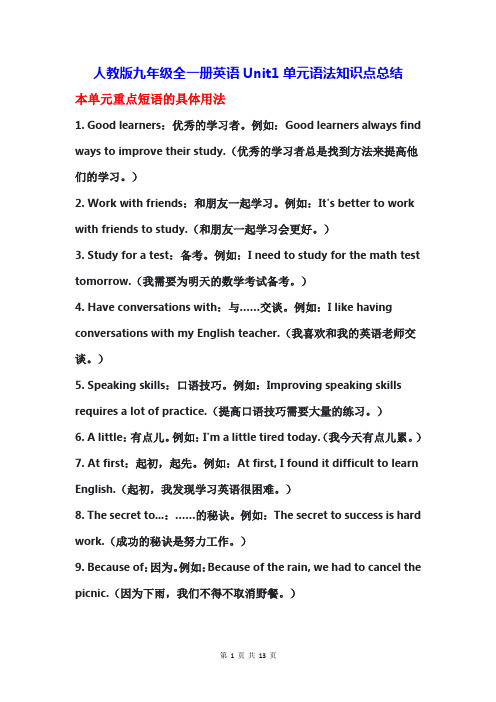
人教版九年级全一册英语Unit1单元语法知识点总结本单元重点短语的具体用法1. Good learners:优秀的学习者。
例如:Good learners always find ways to improve their study.(优秀的学习者总是找到方法来提高他们的学习。
)2. Work with friends:和朋友一起学习。
例如:It's better to work with friends to study.(和朋友一起学习会更好。
)3. Study for a test:备考。
例如:I need to study for the math test tomorrow.(我需要为明天的数学考试备考。
)4. Have conversations with:与……交谈。
例如:I like having conversations with my English teacher.(我喜欢和我的英语老师交谈。
)5. Speaking skills:口语技巧。
例如:Improving speaking skills requires a lot of practice.(提高口语技巧需要大量的练习。
)6. A little:有点儿。
例如:I'm a little tired today.(我今天有点儿累。
)7. At first:起初,起先。
例如:At first, I found it difficult to learn English.(起初,我发现学习英语很困难。
)8. The secret to...:……的秘诀。
例如:The secret to success is hard work.(成功的秘诀是努力工作。
)9. Because of:因为。
例如:Because of the rain, we had to cancel the picnic.(因为下雨,我们不得不取消野餐。
九年级英语全一册(1-14单元)知识点归纳

新人教版九年级英语全册知识点归纳及习题(最新)Unit 1 How can we become good learners?一、短语总结:1. good learners 优秀的学习者2. work with friends 和朋友一起学习3. study for a test 备考4.have conversations with 与……交谈5.speaking skills 口语技巧6.a little 有点儿7.at first 起初;起先8.the secret to......,.......的秘诀9.because of 因为10.as well 也11.look up (在词典中等)查阅;抬头看12.so that 以便,为了13.the meaning of ……的意思14.make mistakes 犯错误15.talk to 交谈16.depend on 依靠;依赖17.in common 共有的18.pay attention to 注意;关注19.connect ……with ……把……联系。
20.for example 例如21.think about 考虑22.even if 即使;尽管;纵容23.look for 寻找24.worry about 担心担忧25.make word cards 制作单词卡片26.ask the teacher for help 向老师求助27.read aloud 大声读28.spoken English 英语口语29.give a report 作报告30.word by word 一字一字地31.so……that 如此……以至于32.fall in love with 爱上33.something interesting 有趣的事情34.take notes 记笔记35.how often 多久一次36.a lot of 许多37.the ability to do sth. 做某事的能力38.learning habits 学习习惯39.be interested in 对……感兴趣40.get bored 感到无聊41.be good at 在……方面擅长42.be afraid of 害怕43.each other 彼此互相44.instead of 代替而不是二.用法集萃1. by doing sth. 通过做某事2.it +be+adj.+to do sth. 做某事是……的3.finish doing sth. 完成某事4.what about doing sth.?做某事怎么样?5.try to do sth. 尽力做某事6.the +比较级,the+比较级越……,就越……7.find it+adj.+to do sth. 发现做某事8.be afraid of doing sth. 害怕做某事9.help sb. (to) do sth. 帮助某人做某事10.practice doing sth. 练习做某事11.keep doing sth. 一直做某事12.be afraid to do sth. 害怕做某事13.begin to do sth. 开始做某事14.want to do sth. 想要做某事15.need to do sth. 需要做某事16.remember to do sth. 记得做某事17.shoot 射(射着,射死等表结果)18.shoot at(瞄准)射Unit1 检测题一.单项选择1.—_______ do you study English? —By listening to tapes.A. HowB. WhereC. WhenD. Why2.You can improve your English practicing more. A.by B.with C.of D.in3. Why not practice your _________English in _________ English-speaking country?A. speaking, aB. speaking, anC. spoken, an4. ______conversations with others is one of the secrets to _____a successful learner.A. Practice, becomeB. Practice, becomingC. Practicing, becoming5 ---There’re a few new words in the article? ---What about _________in your dictionary? A. looking it up B. looking up it C. looking them up6. We’ll go out to play ______ it rains tomorrow. A. so B. unless C. because7. Can you __which is the right answer to the question? A. look for B. find C. find out8. Jenny used to be afraid to ________in class, so she always ________nothing.A. speak, talkedB. speak, saidC. say, spoke9.— Why not listen to BBC news to improve your listening skills?—It’s ______ difficult _____ I can’t follow. A. too; to B. so; that C. such; that10. A good learner often thinks about ________he needs to practice more.A. thatB. whatC. how11.--I’m g oing to listen ____the tape. --OK. Remember to listen ____the key words.A. to, toB. to ,forC. for, to12. ________or not you can learn well depends on your learning habits.A. IfB. WeatherC. Whether13. I have finished _________my report. May I start to learn ________the guitar?A. writing, playingB. writing, to playC. to write, playing14. ---I often make mistakes ____grammar. ---Why not ask your teacher ____help?A. in, toB. in, forC. at, to15. _________write down the new words in your notebook?A. Would you likeB. How aboutC. Could you please16. ---Jack used to have ____writing practice. ---Yes, and he had learned ______.A. a lot of, a lot ofB. a lot of, a lotC. a lot, a lot of17. The more careful you are, ________mistakes you’ll make.A. fewerB. the fewerC. the less18. G ood learners aren’t afraid _____mistakes. Instead, they learn ________mistakes.A. of making, inB. to make, fromC. to make, in19. For the first time, pay attention _________quickly to get the main ideas.A. to readB. readingC. to reading20.I discovered that listening to is the secret language learning.A. something interesting, toB. interesting something, toC. something interested, ofD. interested something of21.Jenny found it very easy English well.A. learningB. to learnC. learnD. learned22. He_____ with the girl with golden hair and will soon get married____ her.A. falls in love; toB. is in love; toC. loves; withD. loves; to23. My father thinks _____ is a great way to learn English.A. study grammar.B. I study grammar.C. studying grammar.D. studies grammar24 Why not ___ your teacher for help when you can’t finish _____ it by yourself?A. ask; writeB. to ask; writingC. ask; writingD. asking; write25. — I wonder if I can learn English well.—. All things are difficult before they are easy.A. I am afraid soB. You’re slowC. It takes timeD. It’s a piece of cake26 You’ll find _____________ easy to learn it well. A. that B. its C. it D. this27. –I don’t have a partner to practice English ______________.---Why not join an English language club to practice _______________?A. /; speakingB. with; to speakC. /; to speakD. with; speaking28. ---She hardly makes mistakes _________English grammar.---No, it seems that she was born ________the ability to learn languages.A. in, withB. with, inC. in, inD. with, with二用所给单词的适当形式填空。
人教版九年级英语全册各单元知识点总结
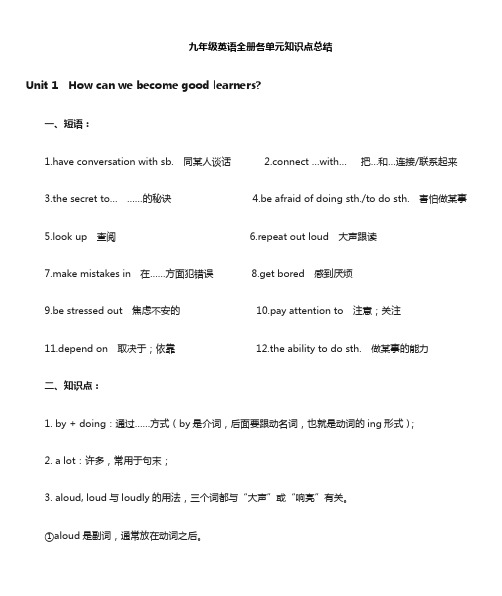
九年级英语全册各单元知识点总结Unit 1 How can we become good learners?一、短语:1.have conversation with sb. 同某人谈话2.connect …with… 把…和…连接/联系起来3.the secret to… ……的秘诀4.be afraid of doing sth./to do sth. 害怕做某事5.look up 查阅6.repeat out loud 大声跟读7.make mistakes in 在……方面犯错误8.get bored 感到厌烦9.be stressed out 焦虑不安的10.pay attention to 注意;关注11.depend on 取决于;依靠12.the ability to do sth. 做某事的能力二、知识点:1. by + doing:通过……方式(by是介词,后面要跟动名词,也就是动词的ing形式);2. a lot:许多,常用于句末;3. aloud, loud与loudly的用法,三个词都与“大声”或“响亮”有关。
①aloud是副词,通常放在动词之后。
②loud可作形容词或副词。
用作副词时,常与speak, talk, laugh等动词连用,多用于比较级,须放在动词之后。
③loudly是副词,与loud同义,有时两者可替换使用,可位于动词之前或之后。
4. not …at all:一点也不,根本不,not经常可以和助动词结合在一起,at all 则放在句尾;5. be / get excited about sth.:对…感到兴奋;6. end up doing sth:终止/结束做某事;end up with sth.:以…结束;7. first of all:首先(这个短语可用在作文中,使得文章有层次);8. make mistakes:犯错make a mistake 犯一个错误;9. laugh at sb.:笑话;取笑(某人)(常见短语)10. take notes:做笔记/记录;11. native speaker 说本国语的人;12. make up:组成、构成;13. deal with:处理、应付;14. perhaps = maybe:也许;15. go by:(时间)过去;16.each other:彼此;17.regard… as … :把…看作为…;18.change… into…:将…变为…;19. with the help of sb. = with one's help 在某人的帮助下(注意介词of和with,容易出题)20. compare … to …:把…比作… compare with 拿…和…作比较;21. instead:代替,用在句末,副词;instead of sth / doing sth:代替,而不是(这个地方考的较多的就是instead of doing sth,也就是说如果of后面跟动词时,要用动名词形式,也就是动词的ing形式)22.Shall we/ I + do sth.? 我们/我…好吗?23. too…to:太…而不能,常用的句型是too+形容词/副词+ to do sth.Unit 2 I think that moon cakes are delicious!一、短语:1. the Lantern Festival 元宵节2. the Dragon Boat Festival 端午节3. the Water Festival 泼水节4. remind sb. of 使某人想起5. eat five meals a day 一天吃五餐6. put on five pounds 体重增加了五磅7. treat sb. with. 用/以……对待某人8. be similar to... 与.......相似9. end up 最终成为/处于10. share sth. with sb. 与……分享……11. as a result结果12. one... the other... (两者中的) 一个…另一个…13. take sb. out for dinner 带某人出去吃饭14. dress up 乔装打扮15. haunted house 鬼屋16. the beginning of new life 新生命的开始二、知识点:1.宾语从句:(三大考点:引导词、时态和语序。
人教版九年级英语Unit1知识点总结

Unit1 How can we become good learners?一、语法点:介词by的用法1. by doing sth. 通过做某事的方式eg: —How can you improve your pronunciation? —By listening to tapes.2. 表示传达、传递的方式或媒介eg:How did you tell him about it, by letter or by e-mail?3. by + 交通工具eg: Every day I go to school by school bus.4. 在……的旁边eg: I’m sitting by the lake.5. 不迟于、在…之前eg: Please come home by 10 p.m.6. 创作eg: I have already read the book by Mo Yan.二、知识点1. by asking the teacher for help①by 介词通过,表示通过某种方式by doing sth. 通过做某事的方式eg: We visited Beijing University by riding bikes last weekend.②与ask相关的短语ask sb. for sth. 向某人要某物eg: He always asks his parents for money.ask sb. about sth. 向某人询问某事eg: Can I ask you about the result of test?ask sb. ( not) to do sth. 要求某人(不)做某事eg: My mother asks me not to play in the street.2. Do you have conversations with friends in English?have conversations with sb. = have a conversation with sb.与某人交谈/谈话make a conversation 编对话3. What about reading aloud to practice pronunciation?①aloud adv. 大声地;出声地eg: We should read English aloud. 我们应该大声读英语②practicev. 练习practice doing sth. 练习做某事eg: They practice speaking English every morning.n. 练习(不可数名词)eg: Students get practice in the English club.4. I’ve learned a lot (in) that way.in this/that way 用这种/那种方式5. Don’t read word by word.①word by word 一个字一个字的eg: He often read English word by word.②和word by word类似的短语有:day by day 一天天地one by one 一个一个地6. Well, be patient. It takes time.patientadj.耐心的①be patient with sb. 对某人有耐心eg: Our teachers are patient with us.②be patient to do sth. 有耐心做某事eg: Teachers should be patient to teach students.n. 病人eg: There are many patients in the hospital.7. The more you read, the faster you’ll be.the+比较级,the+比较级越…… 越……eg: The more you practice, the better you can understand.8. Why did Wei Fen find it difficult to learn English?find it + adj. + (for sb.) + to do sth. 发现做某事(对于某人)是…make it + adj.+ (for sb.) + to do sth. 使(某人)做某事成为…think it + adj. + (for sb.) + to do sth. 认为做某事(对于某人)是…feel it + adj. + (for sb.) + to do sth. 感觉做某事(对于某人)是…eg: Computers make it easier to keep in touch with friends.电脑使我们获得消息更容易了。
九年级英语第1单元-知识点总结

九年级英语第1单元-知识点总结第一部分:基础词汇和短语1. Greetings and Introductions在英语中,问候和介绍是日常生活中常用到的交际用语。
常见的问候方式包括:“Hello!”、“Hi!”、“Goodmorning/afternoon/evening!”等。
而自我介绍的常用表达为“I am...”、“My name is...”等。
2. Classroom English在教室里,学生和老师之间的交流需要使用一些特定的英语表达。
例如,“May I come in?”、“May I go to the washroom?”、“Can you repeat that, please?”等。
3. Numbers and Dates数字和日期是我们日常生活中无法绕开的内容。
需要掌握基本的数字、基数词、序数词等,以及日期的表达,例如“Today is...”、“It's Monday.”、“My birthday is on October 15th.”等。
4. Time谈论时间也是英语学习的重要内容,掌握“in themorning/afternoon/evening”、“at 9 o'clock”、“from...to...”等表达方式非常实用。
5. School Subjects and Facilities学校科目和设施是我们在学校中经常需要提及的。
诸如“Mathematics”、“Science”、“Library”、“Computer lab”等词汇需要熟练掌握。
6. Adjectives and Adverbs形容词和副词是用来描述人、事物和行为的重要词汇。
例如“beautiful”、“kind”、“quickly”、“carefully”等。
第二部分:语法知识点1. Simple Present Tense学习现在时态是英语学习的基础。
在这一时态中,主语和动词的形式要保持一致,例如“I play football.”、“He dances well.”。
九年级英语一到三单元知识点

九年级英语一到三单元知识点Unit 1 How can we become good learners?一、重点单词。
1. textbook (n.) 教科书;课本。
2. conversation (n.) 交谈;谈话,常用于短语“have a conversation with sb.”(与某人交谈)3. aloud (adv.) 大声地;出声地。
区别于“loud”(adj. 大声的,常用来修饰名词,如a loud voice)和“loudly”(adv. 喧闹地,侧重于嘈杂、喧闹的声音)。
例如:Read aloud to practice pronunciation.(大声朗读来练习发音。
)4. pronunciation (n.) 发音;读音。
例如:His pronunciation is very good.(他的发音很好。
)5. sentence (n.) 句子。
6. patient (adj.) 有耐心的;n. 病人。
常用搭配“be patient with sb.”(对某人有耐心)。
例如:Our teacher is patient with us.(我们的老师对我们很有耐心。
)7. expression (n.) 表达(方式);表示;表情。
例如:Facial expressions can show our feelings.(面部表情能展示我们的情感。
)二、重点短语。
1. make word cards 制作单词卡片。
2. listen to tapes 听磁带。
3. ask the teacher for help 向老师求助。
4. read aloud 大声朗读。
5. have conversations with 与……交谈。
6. give a report 作报告。
7. word by word 逐字地。
8. the secret to... ……的秘诀。
例如:The secret to success is hard work.(成功的秘诀是努力工作。
人教版新目标初中英语九年级全一册 知识点总结1单元
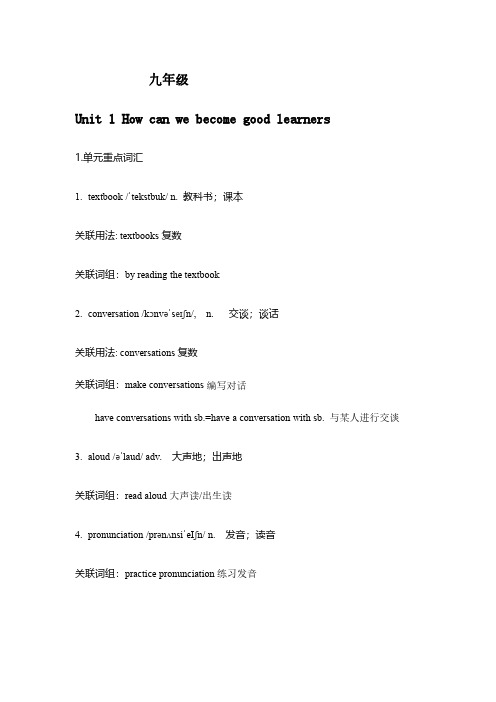
九年级Unit1How can we become good learners1.单元重点词汇1.textbook/ˈtekstbuk/n.教科书;课本关联用法:textbooks复数关联词组:by reading the textbook2.conversation/kɔnvəˈs eɪʃn/,n.交谈;谈话关联用法:conversations复数关联词组:make conversations编写对话have conversations with sb.=have a conversation with sb.与某人进行交谈3.aloud/əˈlaud/adv.大声地;出声地关联词组:read aloud大声读/出生读4.pronunciation/prənʌnsiˈeIʃn/n.发音;读音关联词组:practice pronunciation练习发音5.sentence/ˈsentəns/n.句子关联用法:sentences复数关联词组:by reading the sentence通过读教科书6.patient/ˈpeiʃnt/adj.有耐心的n.病人关联用法:patience名词:耐心;patients复数关联词组:impatient形容词:没有耐心的patiently副词:耐心地be patient with sb.对某人有耐心be patient of sth.对某事能容忍have(no)patience with…对…(没)有耐心lose patience with对…失去耐心out of patience没有耐心7.expression/ikˈspreʃn/n.表达(方式);表示关联用法:expressions复数关联词组:facial expressions面部表情8.discover/dIˈskʌvə(r)/v.发现;发觉关联用法:discovery名词:发现9.secret/ˈsi:krət/n.秘密;adj.秘密的;保密的关联用法:secrets复数关联词组:in secret秘密地;keep a secret保密;a secret plan秘密的计划10.look up(在词典,参考书中或通过电脑)查阅;抬头看11.fall in love with爱上;与⋯⋯相爱12.grammar/ˈgræmə(r)/n.语法关联词组:in grammar在语法方面13.repeat/riˈpi:t/v.重复;重做关联用法:secrets复数关联词组:repetition名词:重复14.note/nəut/n.笔记;记录v.注意;指出关联用法:notes复数关联词组:please note清注意;take notes记笔记15.pal/pæl/n.朋友;伙伴关联词组:pen pal笔友16.physics/ˈfiziks/n.物理;物理学关联单词:adj.物理的;身体的;物质的;根据自然规律的,符合自然法则的关联词组:Space Physics空间物理学物理空间空间物理17.chemistry/ˈkemistri/n.化学关联词组:Organic Chemistry有机化学18.memorize/ˈmeməˌraɪz/v记住;记忆关联单词:memory n.记忆关联用法:过去式memorized过去分词memorized现在分词memorizing第三人称单数memorizes典型例句:Have you memorized your lines for the play yet?你记住剧本中的台词了吗?19.pattern/ˈpætn/,/ˈpætən/n.模式;方式20.pronounce/prəˈnaʊns/v.发音关联用法:过去式pronounced过去分词pronounced现在分词pronouncing第三人称单数pronounces关联词组:Pronounce correctly发音正确正确发音典型例句:I can not pronounce correctly我不能正确发音21.increase/Inˈkri:s/v.增加;增长关联用法:过去式increased过去分词increased现在分词increasing复数increases第三人称单数increasesn.增加;增多;增长关联词组:increase by增加了;按…增长on the increase正在增加,正在增长22.speed/spi:d/n.速度v.加速关联单词:speeding超速关联用法:过去式sped或speeded过去分词sped或speeded现在分词speeding 关联词组:speed up加速加快速度使加速加快speed limit速度限制时速限制限速最高车速23.partner/ˈpa:(r)tnə(r)/n.搭档;同伴24.born/bɔːn/v.出生adj.天生的关联词组:be born with天生具有born yesterday乳臭未干典型例句:Swift was born in1667.斯威夫特生于1667年。
(完整版)仁爱英语九年级上册知识点归纳
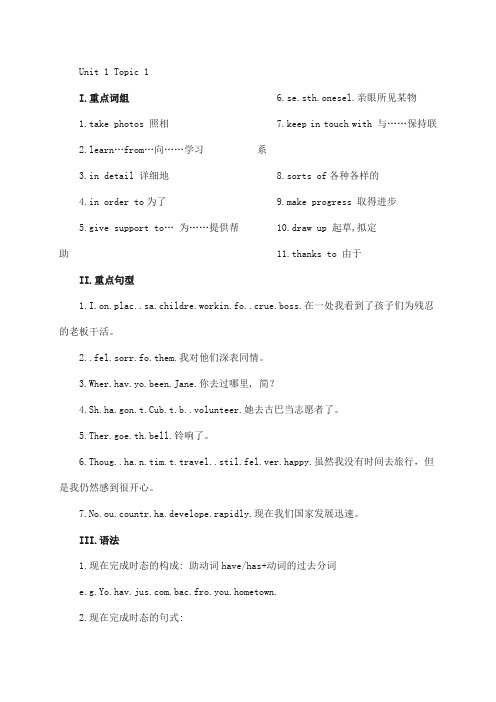
Unit 1 Topic 1I.重点词组1.take photos 照相2.learn…from…向……学习3.in detail 详细地4.in order to为了5.give support to…为……提供帮助6.se.sth.onesel.亲眼所见某物7.keep in touch with 与……保持联系8.sorts of各种各样的9.make progress 取得进步10.draw up 起草,拟定11.thanks to 由于II.重点句型1.I.on.plac..sa.childre.workin.fo..crue.boss.在一处我看到了孩子们为残忍的老板干活。
2..fel.sorr.fo.them.我对他们深表同情。
3.Wher.hav.yo.been.Jane.你去过哪里, 简?4.Sh.ha.gon.t.Cub.t.b..volunteer.她去古巴当志愿者了。
5.Ther.goe.th.bell.铃响了。
6.Thoug..ha.n.tim.t.travel..stil.fel.ver.happy.虽然我没有时间去旅行,但是我仍然感到很开心。
7.No.ou.countr.ha.develope.rapidly.现在我们国家发展迅速。
III.语法1.现在完成时态的构成: 助动词have/has+动词的过去分词.bac.fro.you.hometown.2.现在完成时态的句式:e.g.(1..hav.bee.t.Moun.Huan.wit.m.parents.(2) I haven’t seen him for a long time.(3) Where have you been?(4.——Hav.yo.eve.cleane..room?.——Yes..have..No..haven’t.3.have.ha.been.have/ha.gon.的区别have/has been to sp.表示曾经到过某地—— have/has gone to sp.表示已经去了某地e.g.(1..hav.bee.t.Moun.Huan.wit.m.parents. .(2.Sh.ha.gon.t.Cub.t.b..vo lunteer.Unit 1 Topic 2I.重点词组1. get lost 迷路2. each other 彼此3.at least 至少4take place发生5because of 因为6.b.stric.wit.sb.对某人严格要求.7.carry out 实行8.be short of 缺乏9.take measures to do sth.采取措施做某事10.be known as…作为……而著名11.work well in doing…在……方面起作用12.a couple of 一些13keep up with赶上,跟上II.重点句型1.Hav.yo.foun.hi.yet.你已经找到他了吗?2.——.reall.hat.t.g.shopping.我的确讨厌购物。
九年级英语单元知识点归纳总结

九年级英语单元知识点归纳总结
第一单元:认识英语及学习方法
•英文字母及读音
•英语学习方法
•如何记忆单词
第二单元:日常活动
•表示时间及时间状语的用法
•表示频率的副词
•日常活动的动词及其动作
•简单的日常对话
第三单元:人物介绍
•关于人物的词汇
•人物介绍的表达方式
•个人喜好及爱好的表达
•运用简单的语句进行人物介绍
第四单元:校园生活
•地点介绍及定位
•学习及生活用品的词汇
•日常校园生活的词汇及表达方式
第五单元:爱好与兴趣
•常见爱好及兴趣的表达
•运用简单的语句描述爱好及兴趣
•爱好及兴趣相关的动词及介词的使用方法
第六单元:家庭及家庭成员
•家庭成员的词汇及其关系
•家庭成员的身份和职业
•家庭成员对话的表达方式及简单对话
第七单元:旅游
•旅游景点及地点介绍
•旅行交通方式及方法
•旅游活动及行程的安排
第八单元:饮食及购物
•食物及饮品的种类及口味描述
•购物的词汇及场所介绍
•运用简单的语句进行购物及饮食的对话
第九单元:健康及运动
•健康生活方式及饮食、运动的正误
•运动及健康的搭配及其表达方式
•安排运动活动及关于健康的介绍
第十单元:社交
•社交场合用语及礼仪介绍
•社交活动及对话表达方式
•运用简单的语句进行社交场合的交流
以上是九年级英语单元知识点的归纳总结,希望对大家的学习有所帮助。
九年级英语知识点语法单元归纳
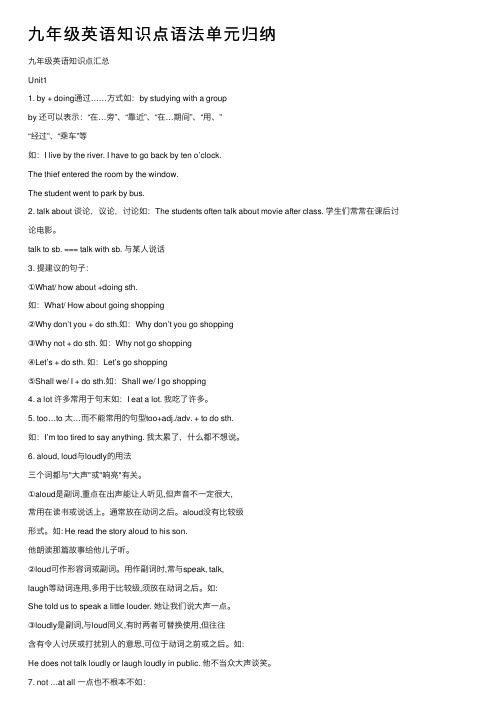
九年级英语知识点语法单元归纳九年级英语知识点汇总Unit11. by + doing通过……⽅式如:by studying with a groupby 还可以表⽰:“在…旁”、“靠近”、“在…期间”、“⽤、”“经过”、“乘车”等如:I live by the river. I have to go back by ten o’clock.The thief entered the room by the window.The student went to park by bus.2. talk about 谈论,议论,讨论如:The students often talk about movie after class. 学⽣们常常在课后讨论电影。
talk to sb. === talk with sb. 与某⼈说话3. 提建议的句⼦:①What/ how about +doing sth.如:What/ How about going shopping②Why don’t you + do sth.如:Why don’t you go shopping③Why not + do sth. 如:Why not go shopping④Let’s + do sth. 如:Let’s go shopping⑤Shall we/ I + do sth.如:Shall we/ I go shopping4. a lot 许多常⽤于句末如:I eat a lot. 我吃了许多。
5. too…to 太…⽽不能常⽤的句型too+adj./adv. + to do sth.如:I’m too tired to say anything. 我太累了,什么都不想说。
6. aloud, loud与loudly的⽤法三个词都与"⼤声"或"响亮"有关。
①aloud是副词,重点在出声能让⼈听见,但声⾳不⼀定很⼤,常⽤在读书或说话上。
九年级英语第一单元知识点归纳总结

九年级英语第一单元知识点归纳总结一、重点词汇1、 textbook n 教科书;课本2、 conversation n 交谈;谈话3、 aloud adv 大声地;出声地4、 pronunciation n 发音;读音5、 sentence n 句子6、 patient adj 有耐心的 n 病人7、 expression n 表情;表示;表达方式8、 discover v 发现;发觉9、 secret n 秘密;秘诀 adj 秘密的;保密的10、 grammar n 语法11、 repeat v 重复;重做12、 note n 笔记;记录 v 注意;指出13、 pal n 朋友;伙伴14、 physics n 物理;物理学15、 chemistry n 化学二、重点短语1、 work with friends 和朋友一起学习2、 make word cards 制作单词卡片3、 read aloud 大声朗读4、 practice conversations with 与练习对话5、 improve speaking skills 提高口语技能6、 give a report 作报告7、 at first 起初;起先8、 word by word 逐词地9、 be patient 有耐心10、 the secret to 的秘诀11、 because of 因为12、 fall in love with 爱上13、 look up 查阅;抬头看14、 take notes 做笔记15、 keep a diary 写日记三、重点句型1、 How do you study for a test? 你是怎样为考试而学习的?2、 I study by working with a group 我通过小组合作来学习。
3、 It's too hard to understand spoken English 英语口语太难懂了。
九年级英语单元知识点(必备12篇)

九年级英语单元知识点(必备12篇)九年级英语单元知识点(1)疑问词是疑问代词“who, whom, what, which, whose”和疑问副词“when, where, how, why ”。
此外,连接词“whether”也适用。
“疑问词+不定式动词”结构有何功用呢?其主要功用有下列五种:⑴当主语,如:When to hold the meeting has not yet beenWhere to live is aHow to cope with the rising cost of living becomes a daily discussion ⑵当宾语,如:We must know what to say at aHe could not tell whom toDo you know how to play bridge?⑶当补足语,如:The problem is where to find the financialThe question is who to⑷当名词同位语,如:Tom had no idea which book to readDo you have a rough impression how to do it?⑸当宾语补足语,如:Jim is not sure whose toMary and John are not certain whether to get married or适用于“疑问词+不定式动词”的动词包括:“know, see, decide, tell, ask, consider, discover, explain, forget, guess, hear, imagine, inquire, learn, remember, think, wonder, understand”等。
有点值得特别注意的是:当这结构当宾语时,它的作用等于名词分句,例如:I could not decide which dictonary to / I could not decide which dictionary I shouldJack did not know where to find such a good Jack did not know where he could find such a good有些动词,如“ask, show, tell, advise, inform, teach”等,可以先有个宾语,然后才接着加上适当的“疑问词+不定式动词”结构。
九年级英语全一册Unit 1知识点总结
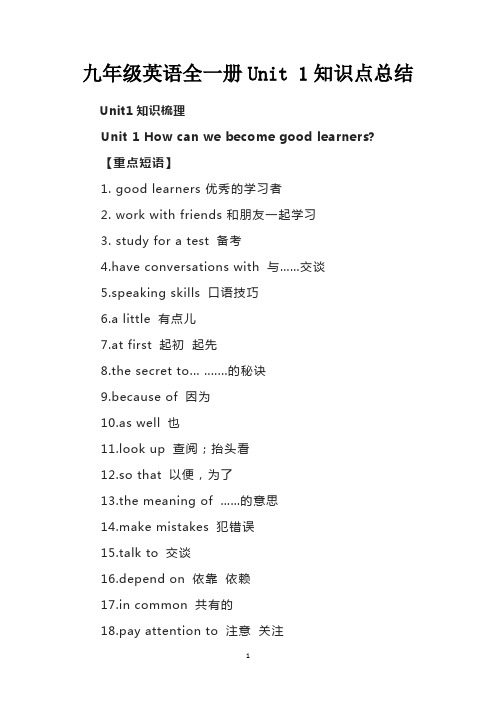
九年级英语全一册Unit 1知识点总结Unit1知识梳理Unit 1 How can we become good learners?【重点短语】1. good learners 优秀的学习者2. work with friends 和朋友一起学习3. study for a test 备考4.have conversations with 与……交谈5.speaking skills 口语技巧6.a little 有点儿7.at first 起初起先8.the secret to... .......的秘诀9.because of 因为10.as well 也11.look up 查阅;抬头看12.so that 以便,为了13.the meaning of ……的意思14.make mistakes 犯错误15.talk to 交谈16.depend on 依靠依赖17.in common 共有的18.pay attention to 注意关注19. connect …with …把……联系20.for example 例如21.think about 考虑22.even if 即使尽管纵容23.look for 寻找24.worry about 担心担忧25.make word cards 制作单词卡片26.ask the teacher for help 向老师求助27.read aloud 大声读28.spoken English 英语口语29.give a report 作报告30.word by word 一字一字地31. so……that 如此……以至于32.fall in love with 爱上33.something interesting 有趣的事情34.take notes 记笔记35.how often 多久一次36.a lot of 许多37.the ability to do sth. 做某事的能力38.learning habits 学习习惯39.be interested in 对……感兴趣40.get bored 感到无聊【重点句型】1.提建议的句子:①What/ how about +doing sth.? 做…怎么样?如:What/ How about going shopping?②Why don't you + do sth.? 你为什么不做…?如:Why don't you go shopping?③Why not + do sth. ? 为什么不做…?如:Why not go shopping?④Let's + do sth. 让我们做…吧。
九年级上册英语重点笔记

九年级上册英语重点笔记一、Unit 1 How can we become good learners?1. 重点单词。
- textbook(教科书;课本)- conversation(交谈;谈话),have a conversation with sb.(与某人交谈)- aloud(大声地;出声地),区别于loud(大声的,形容词,常用来修饰名词,如a loud voice)和loudly(大声地,副词,含有喧闹之意)。
- pronunciation(发音;读音)- sentence(句子)- patient(有耐心的;病人),be patient with sb.(对某人有耐心)- expression(表达(方式);表示)2. 重点短语。
- by doing sth.(通过做某事),例如:I learn English by reading English books.(我通过读英语书学习英语。
)- make mistakes(犯错误),make a mistake也可。
- look up(查阅;抬头看),通常指在词典等资料中查找信息,如look up the word in the dictionary(在词典里查这个单词)。
- take notes(做笔记)- be born with(天生具有),例如:He is born with a good memory.(他天生记忆力好。
)- pay attention to(注意;关注),to是介词,后面接名词、代词或动名词,如pay attention to your pronunciation(注意你的发音)。
3. 重点句型。
- What about doing sth.?(做某事怎么样?)用于提出建议,例如:What about listening to English songs?(听英语歌曲怎么样?)- How do you study for a test?(你如何为考试而学习?)- I study by working with a group.(我通过小组合作来学习。
九年级英语1-3单元知识点人教版

九年级英语1-3单元知识点人教版Unit 1 How can we become good learners?一、重点单词。
1. textbook:n. 教科书;课本。
2. conversation:n. 交谈;谈话。
3. aloud:adv. 大声地;出声地(区别于loud,loud可作形容词或副词,侧重声音响亮;aloud强调出声,能让人听见)4. pronunciation:n. 发音;读音。
5. sentence:n. 句子。
6. patient:adj. 有耐心的;n. 病人(be patient with sb. 对某人有耐心)7. expression:n. 表达(方式);表示。
8. discover:v. 发现;发觉(指发现原本存在但不为人知的事物)9. secret:n. 秘密;秘诀;adj. 秘密的;保密的(the secret to... ……的秘诀)10. look up:查阅;抬头看(look up a word in the dictionary在字典里查单词)二、重点短语。
1. by working with friends:通过和朋友一起学习。
2. make word cards:制作单词卡片。
3. read aloud:大声朗读。
4. practice doing sth.:练习做某事。
5. be afraid to do sth.:害怕做某事(be afraid of doing sth. 担心会发生某事)6. fall in love with:爱上;与……相爱。
7. as well:也(用于肯定句末,相当于too)8. look up to:钦佩;仰慕。
9. take notes:记笔记。
10. make mistakes in:在……方面犯错误。
三、重点句型。
1. How do you study for a test? 你如何为考试而学习?- I study by listening to tapes. 我通过听磁带学习。
- 1、下载文档前请自行甄别文档内容的完整性,平台不提供额外的编辑、内容补充、找答案等附加服务。
- 2、"仅部分预览"的文档,不可在线预览部分如存在完整性等问题,可反馈申请退款(可完整预览的文档不适用该条件!)。
- 3、如文档侵犯您的权益,请联系客服反馈,我们会尽快为您处理(人工客服工作时间:9:00-18:30)。
Unit1 How can we become good learners?Unit9 I like music that I can dance to.【重点短语】1. expect to do sth. 期望做某事expect sb. to do sth 期望某人做某事2. catch up with 追上,赶上3. different kinds of music 各种不同的音乐4. quiet and gentle songs 轻柔的歌曲5. take…to…带……到……6. remind…of…使某人想起或意识到……7. her own songs 她自己的歌曲8. be important to 对……重要9. Yellow River 黄河10. Hong Tao’s latest movie 洪涛最近的电影11. over the years 多年来12. be sure to do sth. 务必/一定做某事13. one of the best known Chinese photographers 世界上最有名的中国摄影家之一14. on display 展览,展出15. come and go 来来往往16. can’t stand 不能忍受【重点句型】1. I love singers who write their own music. 我喜欢自己创作曲子的歌手。
2. We prefer music that has great lyrics. 我们更喜欢歌词很棒的音乐。
3. What do you dislike about this CD. 你不喜欢这张CD的什么?4. What does it remind you of?它使你想起了什么?5. The music reminds me of Brazilian dance music. 这首曲子使我想起了巴西舞曲。
6. It does have a few good features, though. 然而,它的确也有一些好的方面。
7. She really has something for everyone. 每个人的确都能从她的作品中领悟到一些东西。
8. Whatever you do, don’t miss this exhibition. 无论怎样,你都不能错过这个展览会。
9. As the name suggests, the band has a lot of energy. 正如乐队名字所暗示的那样,这支乐队很有活力。
10. Some people say they are boring, but others say they are great. 有些人说他们很无聊,但也有人说,他们是伟大的。
11. I f I were you, I’d eat nuts instead. 如果我是你,我会改吃坚果。
【考点详解】1. prefer v. 更喜欢,宁愿prefer sth. 更喜欢某事 I prefer English. 我更喜欢英语。
prefer to do. 宁愿做某事 I prefer to sit. 我宁愿坐着。
prefer sth to sth. 同…...相比更喜欢…... I prefer dogs to cats. 与猫相比我更喜欢狗。
prefer doing to doing. 宁愿做某事而不愿做某事 I prefer walking to sitting. 我宁愿走路也不愿坐着。
2. along with 伴随… , 同…一道I will go along with you. 我同你一道去。
3. dance to sth. 随着…...跳舞(用的介词是to,这一点要注意)She likes dancing to the music. 她喜欢随着音乐而跳舞。
4. music n. 音乐musician n. 音乐家5. unfortunately adv.不幸运地fortunately adv.幸运地(如果你把这个词记住了,那考试的时候你就是幸运的~)6. fun n. 有趣 funny adj. 有趣的,滑稽的7. be sure to do 一定做某事,肯定做某事It is sure to snow. 肯定要下雪8. known adj. 有名的,著名的(记住意思)9. on display 展览(常见短语)10. energy n.活力 energetic adj.有活力的11. most of………的大多数12. keep healthy 保持健康13. get together 聚在一起14. discuss v.讨论 discussion n.讨论15. be bad for sth. 对…有坏处16. take care of = look after 照顾She often takes care of/looks after her son.17. stay away from 远离……Stay away from me. I have a cold. 请远离我,我得了感冒18. to be honest 老实说To be honest I really like flowers. 老实说我真的很喜欢花。
19. dislike 不喜欢反义词:like 喜欢20. fisherman 渔夫它的复数形式是fishermen21. photography n. 摄影;photograph n. 照片相片;photographer n. 摄影师22. be in agreement 意见一致,常与介词on/about连They are in agreement on that question. 他们对那个问题意见一致。
23. even if 甚至24. mainly adv. 主要地首要地Unit10 You're supposed to shake hands.【重点短语】1. be supposed to do 被期望/应该做......2. shake hands 握手3. for the first time 第一次4. table manners 餐桌礼仪5. drop by 偶然拜访,顺便拜访6. after all 毕竟,终究7. be on time 准时8.(in) the wrong way 以错误的方式9. be relaxed about 对……比较随意/放松10. a bit 一点【重点句型】1. He should have told me about it. 他本应该把这件事告诉我。
2. Where I’m from, we’re pretty relaxed about time. 我所在的地方,对时间是相当宽松的。
3. We often just drop by our friends’homes. 我们时常去朋友家拜访。
4. Often we just walk around the town center, seeing as many of our friends as we can. 我们经常走遍市中心,看尽可能多的朋友。
5. We usually make plans to see friends. 通常我们都是做好去看朋友的计划。
6. We’re the land of watches, after all. 毕竟,我们是表之乡。
7. It’s even better than I thought it would be. 事情比我想象的要好得多。
8. They go out of their way to make me feel at home. 他们花尽心血让我感觉不到拘束。
9. Although I still make lots of mistakes, it doesn’t bother me like it used to. 尽管我经常出一些错,但它不像过去那样打扰我。
10. I thought that was pretty strange at first, but now I’m used to it. 开始,我想那是太奇怪了,但是现在我已经习惯了。
11. I have to say I find it difficult to remember everything, but I’m gradually getting used to things, and don’t find them so strange anymore. 不得不承认,我发现记住一切东西是很困难的,但我渐渐习惯了,并且发现他们也不再那么奇怪了。
【考点详解】1. be supposed to do 应该(注意它的翻译,另外supposed后面用的是不定式to do)We are supposed to stop smoking. 我们应该停止吸烟。
3. You should have asked what you were supposed to wear. 你本应该问清楚怎么样穿才得体。
上句中的“should have asked”是“情态动词+现在完成时”表示过去本应该做某事,事实上没有做(这点要清楚)She should have gone to Beijing. 她本应该去了北京。
(没有去)4. be relaxed about sth. 对某事随意、不严格They are relaxed about the time. 他们对时间很随意。
5. pretty adv. 相当,很 adj. 美丽的She is pretty friendly. 她相当友好。
She is a pretty girl. 她是一个美丽的女孩。
6. plan to do. 打算做某事(常见用法)She has planed to go to Beijing.7. drop by 访问,看望,拜访,串门We just dropped by our friends' homes.我们刚刚去朋友家串门。
8. on time 按时(in time的意思是及时,这两个短语经常出现在辨析题中)9. after all 毕竟终究(五星级重点词汇,记住它的意思)You see I was right after all. 你看,毕竟还是我对了。
10. invite sb. to do sth. 邀请某人做某事(重要内容,注意后面用的是不定式to do)Lily invited me to have dinner. 莉莉请我吃晚饭。
